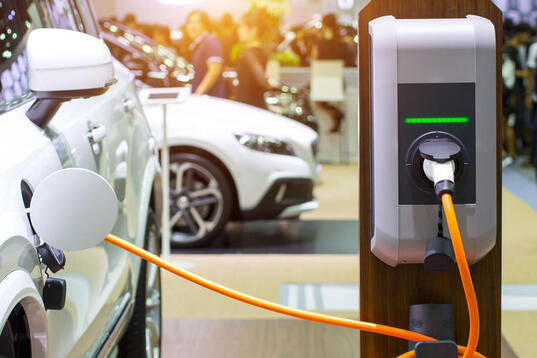To support the transition to low-carbon mobility, Delta implemented a smart workplace EV charging system that optimizes energy use while helping employees adopt electric vehicles.
This approach was featured by The Climate Group in their EV100 Learnings series as a best practice.
Read the full article on The Climate Group’s website
In this new series, members of our influential EV100 network of electric fleet pioneers share key insights from the first phase of their EV transition. Delta was a first mover on deploying EV charging infrastructure at its sites. Here, the Taiwanese electronics manufacturer shares insights into how innovative technology can be used to regulate employee charging behaviour. The system avoids bottlenecks – and boosts employee use.
In the wave of electric vehicle (EV) transformation, EV100 members commonly face multiple challenges such as surging charging infrastructure loads in buildings, grid capacity constraints, inefficient integration of renewable energy, and peak-hour charger scrambles. Being an early mover in the EV transition, Delta Electronics leverages innovative technologies and practical management models to overcome key bottlenecks.
As the first provider of electric vehicle energy infrastructure among EV100 members, Delta Electronics is committed to widely deploying EV charging facilities at major operational sites by 2030. In the first phase, we offer free use of EV chargers to employees and external visitors, supporting the shift to low-carbon transportation as part of our efforts to combat climate change. By installing EV chargers at office sites and offering free charging, employee EV usage has grown exponentially – validating the enormous potential of combining incentive mechanisms with supportive infrastructure. Take the Delta Shanghai Operation Center for example. In 2024, 171 employee-owned EVs were registered for commuting, accounting for 36% of total private vehicles.
The rising adoption of EVs has significantly increased electricity demand, challenging grid stability. To meet the dual technical and energy challenges, our Shanghai Operation Center and Americas Headquarter in Fremont have integrated photovoltaic and energy storage systems with EV charging infrastructure to create sustainable energy ecosystems.
The Shanghai site’s 31 AC/DC chargers with PV-storage systems use batteries to manage fast-charging loads and store solar energy, while an AI-powered DeltaGrid® EVM optimizes scheduling – boosting off-peak usage by 19%, reducing peak demand by 18%, saving 255,000 RMB annually, and facilitating the acquisition of LEED Zero Energy certification. The Americas HQ combines 616kW rooftop PV, 504kW bifacial carports and 330kWh storage to generate 1.4M kWh/year - fully powering operations as Fremont's first LEED Zero Energy building. Both showcase the successful integration of EV charging with renewable energy systems while achieving LEED Zero Energy certification.
Due to the increasing number of employees using electric vehicles, and charging them at office sites, long queues and intense competition for chargers are common during peak hours. To tackle this issue, we have independently developed charging usage policies and a management system to regulate employees’ charging behaviours.
By integrating IT technology and energy management, we have enhanced an existing system platform with a charging reservation function. Users must pre-book charging slots and scan a QR code to activate charging. The system automatically notifies users and cuts power when reservations expire, preventing prolonged occupancy. The combined implementation of management measures and the reservation system has notably improved the utilization rate of EV chargers.
Our practice confirms that innovation is the key to overcoming EV transition challenges. The trinity strategy of renewable energy application, intelligent technology empowerment, and innovative mechanism design has proven effective in addressing these transition challenges. We’ve witnessed first-hand how this innovative approach turns challenges into competitive advantages. Let’s build a low-carbon transportation ecosystem where electric transport evolves from corporate practice to the new normal, fueled by the same innovative spirit that has defined our transition journey.
*****
This thought leadership piece was contributed by Delta Electronics as part of the EV100 relaunch. EV100 is Climate Group’s global network of corporate leaders driving the transition to zero-emission road transport.
Through the year, #EVLearnings are exclusive to EV100 members via the Members Hub.
*****
News Source:
Make employee charging smarter and more popular? Integrated IT will help | Climate Group
